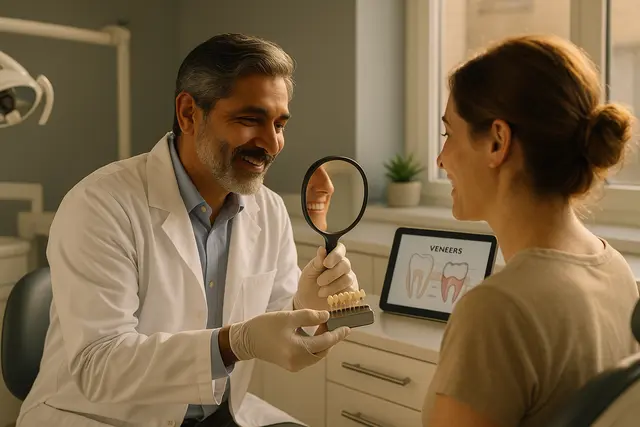Cosmetic Dentistry
6 min read
Mar 20, 2025
Veneers vs. Crowns: When to Choose Each
Let’s face it, our teeth do a lot more than help us chew. They shape our smile, boost our confidence, and, honestly, they’re the unsung heroes of first impressions. But when a tooth chips, cracks, discolors, or just doesn’t look like its best self anymore, we start looking into options. That’s when the big decision hits: veneers vs. crowns, which one do you really need?

What’s a Dental Crown?
If you’ve ever stared blankly at your dentist while they explained the difference between a veneer or crown, you’re not alone. The truth is, both veneers and crowns can work wonders, but they’re not interchangeable. They each have their moment to shine depending on your dental needs, the condition of your teeth, and what your goals are (cosmetic, functional, or a bit of both). So, let’s break this down the way your dentist should, but with a little more personality and a little less dental jargon.
Think of a dental crown as a helmet for your tooth. It completely covers the entire tooth, protecting it from further damage while restoring its shape and strength. If your tooth is cracked, has had a root canal, or is just plain falling apart, your dentist might say, “You need a crown.” And no, sadly, not the royal kind.
Dental crowns are typically made of porcelain, metal, resin, or a mix. Some patients get metal crowns in the back (for durability), and porcelain crowns in the front for a natural look. A dental crown covers all surfaces of your tooth, so it’s ideal for situations where there’s not much tooth left to work with.
Here’s the catch, though: crowns are more invasive. Your dentist will need to shave down quite a bit of the existing tooth to fit that crown snugly. So while crowns serve an important purpose in restoring functionality and aesthetics, they do require more prep work.
Understanding Veneers and Crowns Together
Veneers and crowns both fix damaged or less-than-perfect teeth, but they go about it differently. Veneers usually focus on the front surface of your teeth, improving how they look rather than how they function. Crowns are thicker, stronger, and wrap around the tooth like a little fortress.
So, when comparing veneers vs crowns, it comes down to this: Is your tooth mostly fine and just needs a little visual upgrade? That’s a veneer job. Is your tooth severely cracked, worn, or post-root canal? The crown may be the better fix.
Veneers: The Aesthetic Advantage
Let’s talk beauty. Cosmetic dental treatments have come a long way, and veneers are thin layers of porcelain or composite that cover the front of your teeth. They’re your ticket to that straight, white, red-carpet smile, no braces or whitening strips required.
Veneers are used to close small gaps in your front teeth, correct discoloration, or fix mildly damaged teeth. They can also reshape teeth that are naturally short, pointy, or uneven. Since veneers require less removal of your natural teeth, they’re often considered a more conservative treatment compared to crowns.
But here’s a heads-up: veneers may not be suitable for people who grind or clench their teeth, because those thin shells can crack under pressure. And if a tooth is already compromised or decayed? A veneer won’t be enough.
The Beauty of a Porcelain Veneer
When it comes to high-end, natural-looking smiles, the porcelain veneer is the gold standard. These are custom-made to match your teeth and are stain-resistant, meaning you can enjoy that morning coffee with a little less guilt.
Porcelain isn’t just about looksm, it’s tough. But tough doesn’t mean indestructible. You’ll still need good dental habits to keep your smile flawless. Also, porcelain veneers can be pricier than composite veneers, but they typically last longer and look more lifelike.
What Your Dentist Wants You to Know
The dentist plays the role of matchmaker here, pairing your needs with the right solution. Whether you're debating crowns and veneers, your dental clinic will consider the health of your tooth, your bite, and what you want the final result to look like.
For example, a dentist might recommend veneers if your front teeth are healthy but stained or slightly chipped. But if that same tooth has had a root canal or is significantly weakened? The dentist will probably steer you toward a crown to protect what’s left of it.
Pros and Cons of Veneers
Let’s lay it out clearly:
Pros:
Less invasive than crowns
Great for purely cosmetic fixes
Quick transformation of your smile
Natural-looking results
Cons:
Not as strong as crowns
Can chip if you grind or bite hard things
Typically only cover the front surface
May not be covered by dental insurance
If you’re after something less drastic and your teeth are in decent shape, cosmetic veneers could be your best friend. But if you’re chasing both form and function? A crown vs veneer comparison becomes essential.
Veneer or Crown? That’s the Big Question
When choosing between a veneer or crown, think about whether you’re fixing the appearance of your teeth or the function of your teeth, or both. Crowns can help restore chewing power and protect compromised teeth. Veneers serve more of a cosmetic role.
So, if you’re looking for a Hollywood smile makeover and your teeth are otherwise healthy, veneers are the right choice. But if your tooth is fractured, post-treatment, or needs structural support? You need a dental crown.
Dental Implants and Other Players
We can’t ignore the big guy in the room, dental implants. If your tooth is so far gone that it can’t even hold a crown, your dentist might suggest pulling it and replacing it with an implant. Crowns are then used as the visible part on top of the implant.
Sometimes, dental bridges are also used when multiple teeth are missing and implants aren’t an option. But for single-tooth fixes, crowns and veneers take the spotlight.
Let’s Talk Dental Care and Long-Term Costs
The cost of veneers and crowns can improve your smile, but they’ll also leave a dent in your wallet. In general, crowns are usually a bit more expensive due to the materials and complexity of the prep. Veneers and crowns cost will vary depending on where you live, your dental office, and your dental insurance.
Insurance may cover dental crowns when they’re medically necessary. But cosmetic dental procedures like veneers? Usually not. Always check with your plan.
Whichever option you choose, regular dental checkups and strong dental hygiene habits are the keys to making that investment last. Crowns can last 10–15 years (sometimes more), while porcelain veneers usually last about 10 years with proper care.
The Crown vs Veneer Showdown
In this crown vs veneer match, there’s no one-size-fits-all winner. It’s about the tooth, the damage, your goals, and your budget. If you have severely damaged or decayed teeth, crowns provide the protection and function you need. If you’re just looking for a smile glow-up, veneers are the right tool for the job.
Remember, crowns are used to strengthen and protect. Veneers are thin, pretty, and play well with front teeth. When in doubt? Talk to your dentist. They’ll weigh in with expert eyes, real-world experience, and a treatment plan that fits your unique mouth.
Caps vs Veneers: Same Game, Different Name?
A quick note on lingo: people often say “caps vs veneers,” but caps are just the old-school name for dental crowns. So if your grandma says you need a cap, she’s talking about a crown, not a baseball accessory.
The Difference Between a Veneer and a Crown
If you’re still wondering what’s the difference between a veneer and a crown, here it is in plain English: veneers cover the front surface, while crowns cover the entire tooth. That’s it. But that one difference changes everything, prep, durability, function, and purpose.
Wrapping It All Up
Deciding between veneers and crowns doesn’t have to feel like a guessing game. The right choice depends on what your tooth needs, what you want to achieve, and what your dentist recommends. And while veneers and crowns are similar, knowing the difference between veneers vs crowns can save you time, money, and future dental stress.
If you’re still unsure? Don’t just Google your way into confusion. Book a consultation with a dental clinic you trust, ask questions, and walk away knowing you’re in good hands. Because whether you’re upgrading your smile or saving a tooth, the right dental treatment can truly change how you show up in the world—smiling confidently and living fully.
What Is the Main Difference Between a Veneer and a Crown?
The key difference is coverage: a veneer covers only the front surface of a tooth, while a crown wraps around the entire tooth. Veneers are ideal for cosmetic upgrades on healthy teeth, while crowns are used when a tooth is damaged, decayed, or needs structural support.
When Should You Choose a Crown Over a Veneer?
A crown is the better option if your tooth is cracked, severely worn, or has had a root canal. It restores both function and appearance by fully covering and protecting the tooth. Veneers, on the other hand, are better for minor aesthetic issues like stains, small chips, or uneven shapes.
Are Veneers Less Invasive Than Crowns?
Yes, veneers are considered less invasive because they require only minimal enamel removal from the front of the tooth. Crowns require more tooth reshaping to fit properly and are generally used in cases where strength and protection are needed in addition to aesthetics.
Will Insurance Cover Veneers or Crowns?
Dental insurance may cover crowns if they’re medically necessary, for example, to restore a broken or decayed tooth. Veneers are typically considered cosmetic and are usually not covered. Always check your plan details or ask your dental office to help verify coverage.
Read Next
Related Posts

Cosmetic Dentistry
Looking for a Dentist Who Whitens Teeth? Here’s What to Know First
A brighter smile can do wonders for your confidence, but finding the right dentist who whitens teeth takes more than just a quick Google search. From treatment options to experience and safety measures, there are a few key things you should know before booking that whitening appointment.
3 min read
Sep 10, 2025

Cosmetic Dentistry
What Type of Dentist Does Veneers? Here’s Who to Trust With Your Teeth
Dreaming of a flawless, photo-ready smile? Veneers can be a game-changer, but only if you choose the right expert to apply them. Understanding who’s qualified to handle this cosmetic procedure is key to getting results that look natural and last for years.
5 min read
Sep 08, 2025

Cosmetic Dentistry
Cosmetic Dentistry and Implants: How They Work Together
A confident smile can do wonders for your self-esteem, and modern dentistry offers more ways than ever to achieve it. Whether you're dealing with missing teeth or simply want a brighter, more balanced look, cosmetic dentistry and dental implants provide powerful solutions that work hand-in-hand to restore both function and aesthetics.
5 min read
Sep 05, 2025
Don’t have time to research every dentist around you?
See why 30k+ patients trusted us